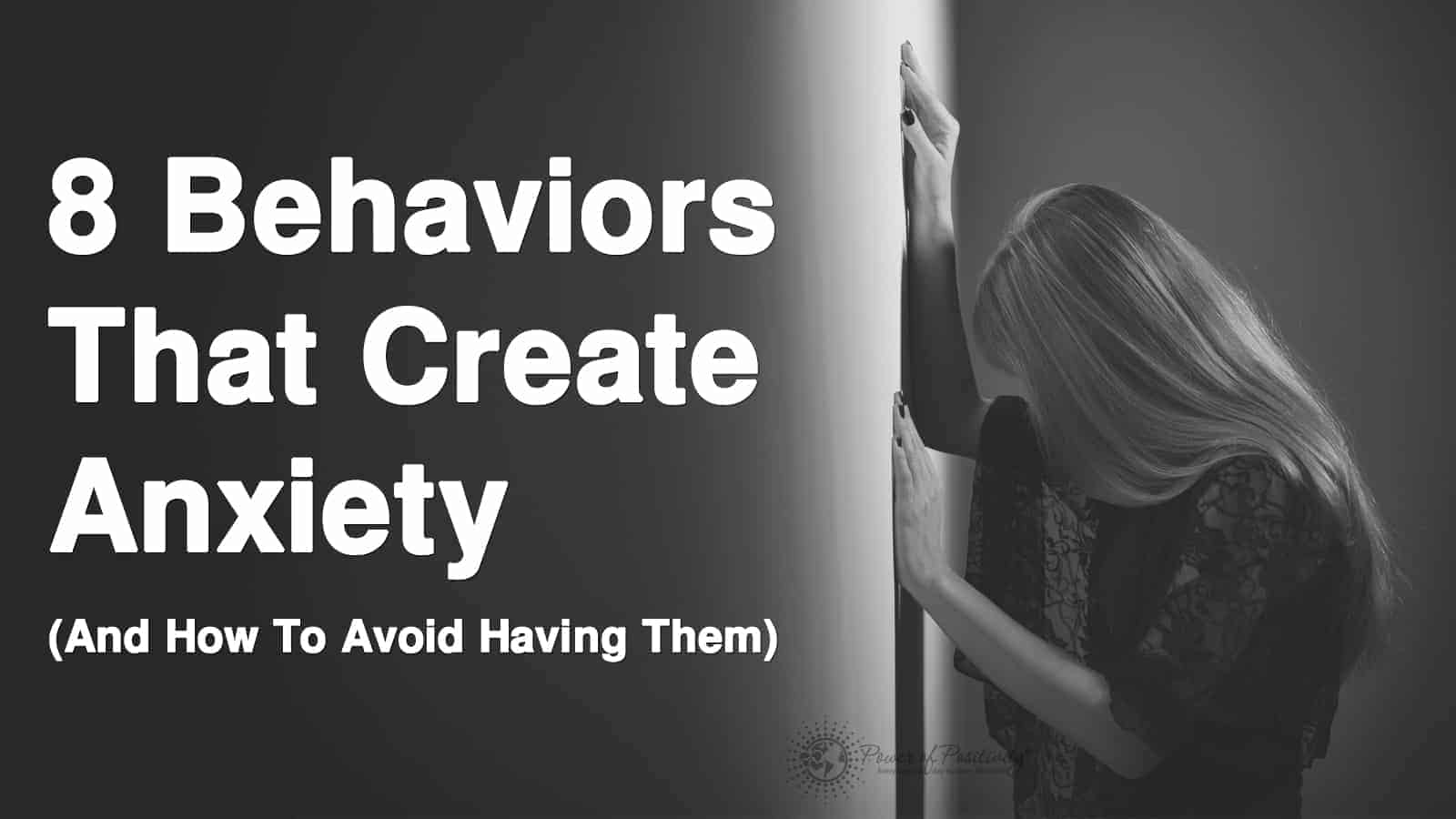As per the American Psychology Association, anxiety is defined as “an emotion characterized by feelings of tension, worried thoughts and physical changes like increased blood pressure. People with anxiety disorders usually have recurring intrusive thoughts or concerns. They may avoid certain situations out of worry.” There is a difference between worrying about something and anxious thoughts. Anxiety circles around and around creating challenges to every situation. About 18% of our population struggles with anxiety. So how can we get a handle on this disorder?
Here are 8 behaviors that create anxiety (and how to avoid having them):
1. Avoidance
By avoiding the issue that causes stress, you are actually creating more anxiety. Avoidance is shoveling dirt under a rug and then wondering why you keep tripping over the mount every time you walk near it. The issues are still there. The more you fight to shut them out of the mind, the stronger they become.
It may seem reasonable to avoid the fears, but if you gently address the situation, you could put it aside. When we avoid one fear, we create another in its place. The best advice is to handle the fear, gently addressing circumstances, and slowly try to handle what is causing them. When we finally face our demons, they can’t hurt us anymore.
2. Denial
Are you aware that you are suffering from anxiety? Denial causes other underlying disorders such as Obsessive Compulsive Disorder (OCD) or other phobias. It can lead to severe depression. Denial is a psychological mechanism that we use when things are too uncomfortable to face. Many psychoanalysts have come to believe that denial is perhaps the first stage of coping with a situation, event, trauma, or experience.
Ask yourself if you are indeed inflicted by fears and phobias that control your thoughts. Denial is often the first step to acceptance. But, until you face the truth, you cannot heal from it.
3. Expectations
Expectations are strong beliefs that something will happen in the future. We place them as targets, and when they don’t happen, we spin out of control. An expectation is a controlled instrument. We utilize it as a safety net for what should happen. However, we have little control on what will happen in the future. So, we are crushed when our expectations get tarnished. This causes tremendous anxiety. We were sure that the plan was going to happen just as we had envisioned.
Expectations are anomalies. They serve as nothing but disappointments. What you continue to put forth as assurance is not always going to come out the way you want. Stop putting expectations in your life. Anxiety arrives in those times that we don’t get what we want. You had a set plan. It didn’t happen, and now you are depressed and stressed because you cannot find another solution. There is always another way. Nothing in life is set in stone.
4. Reassurance
If you are constantly needing the reassurance from others, you most likely suffer from anxiety. By asking and rechecking in with other people, you are reinforcing an irrational mindset that’s affecting your core understanding. Reassurance leads to an unhealthy belief in your own worth and esteem. If you are constantly worrying about what others think, your anxiety will always be elevated.
Trust in your own opinion. If you have to make a decision, believe in yourself to acquire the best plan of action. It’s good to share your thoughts with others, but living by what they judge, criticize and tell you is not healthy. It causes stress and escalates anxieties. You have all the answers within you. Trust in that!
5. Relying Only On Medication
Medication is helpful, but to rely only on a magic pill is irresponsible. Eventually the medication can stop working and the fears will still be there. Commonly prescribed medications such as Xanax, Valium, and Ativan provide a calming effect by boosting the brain’s neurotransmitters. These are called gamma-amnobutyric acid (GABA) and they work in the same way that opioids (such as Heroin) works. These neurotransmitters create a sense of gratification caused by hormones such as dopamine. It’s a false sense of dealing with the anxiety.
Medication helps with stress and anxiety disorders, but it’s no substitute for the long term behavioral programming. In order to live a healthy life, you must rely on positive reinforcements to help ease those thoughts. Exercise, spending time outdoors, meditation, or even listening to music help in reestablishing healthy manners of dealing with the doom of fears. Taking care of yourself while loving and respecting your health will help reprogram the brain. When you are happy, you release natural feel-good hormones.
6. Drugs and Alcohol
Drugs and alcohol can provide a momentary sense of ease with anxiety, but its long term effects are deadly. Substance abuse escalates through depression, anxiety and other mental disorders. Most people numb themselves through these substances and then become addicted to them in order to function.
Using alcohol and drugs to aid with anxiety causes other problems and imbalances your mental state. If you find yourself already dependent, please get help. You are masking the phobias with another issue. Addiction becomes a permanent problem for a temporary solution.
7. Helplessness
The negative self-talks, feeling as if you are insane, sleep disturbances, and believing something is wrong with you are all part of the helplessness that arrives with anxiety. If these behavioral issues are not addressed, they can turn into severe depression and even lead to suicide. Helplessness becomes a spiral-down staircase to hell.
In order to combat this monster, you must let go of the future. You must learn to live now. Helplessness is deteriorating. It’s just like expectations in that you are bound to be hugely disappointed. For a person suffering from anxiety, it’s difficult to hear, “Just let it go.” It’s not that easy. The brain creates scenarios and confirms the disasters. But, when the anxiety kicks in you have the power to substitute the mindset with something positive. Go create, paint, write, or dance. Do something that brings you joy.
8. Psychoanalysis
Anxiety is a faulty activation that becomes your fight or flight system. It’s healthy to have therapy. It’s important to examine the issues from trauma and past circumstances. The overuse of psychoanalysis can sometimes hinder your healing. In many instances, environmental factors and genetics play a huge role in anxiety. It’s important to address the issues that are going now and not get stuck in the past.
We learn from our behaviors and past experiences. We can be guided to make better choices and work towards a healthy lifestyle. Behavior modification is important when dealing with anxiety. The over dosages of psychoanalysis, returning to those painful events, stumps your process. The constant re-examining of past events do not allow for you to see your present situation.
“Our anxiety does not empty tomorrow of its sorrows, but only empties today of its strengths.” ~ Charles Haddon Spurgeon
Related article: 10 Things People With Anxiety Wish You Would Do















